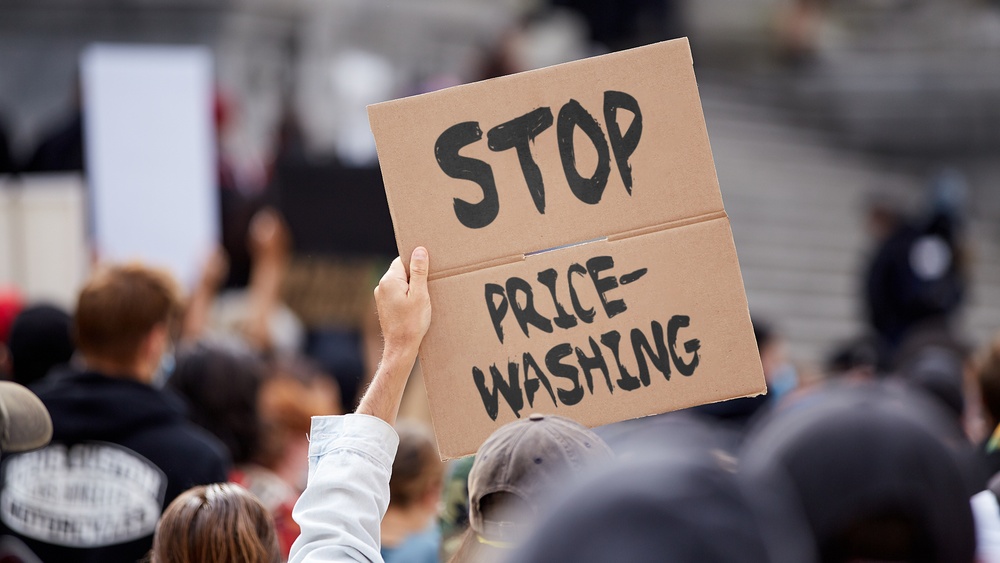One in 10 products on Black Friday 2022 were pricewashed

Shoppers urged to look out for pricewashing - a price quietly rising before sharply dropping during a sales period - this Black Friday
One way that retailers encourage shoppers to buy more on Black Friday is by making discounts look bigger than they actually are. This is an underhand, yet widely-used, sales tactic that price and product comparison service, PriceSpy, is calling out as ‘pricewashing’ - otherwise known as fake sales.
According to PriceSpy, pricewashing isn’t new. In fact, the price comparison service has noticed it a lot over recent years - especially around big sales periods like Black Friday:
-
In 2022, 10% of products were pricewashed*
-
This was a slight drop on 2021 when 14% of products were pricewashed, 2020 when 11% of products were pricewashed and 2019 when 13% of products were pricewashed
-
Specific examples of pricewashing around Black Friday 2022 include:
-
The Masterbuilt Gravity Series 1050 barbecue saw a gradual increase in price from the start of October, before dropping in price ten days before Black Friday. It ultimately cost £749 on Black Friday, compared to £649 at the start of October
-
The Fitbit Charge 5 gradually rose then fluctuated in price from 4th October, before beginning its drop in price seven days before Black Friday. It ended up being on sale for £99.99 on Black Friday, compared to £80 at the start of October
-
The Garmin Instinct Solar started increasing in price from mid-late October and yo-yoed in price until the week before Black Friday. It ultimately cost £179 on Black Friday, compared to £144.99 in mid-October
Liisa Matinvesi-Bassett, UK country manager at PriceSpy, explains: “Pricewashing is a way that retailers make offers appear better than they really are. It won’t always be a deliberate tactic, however the fact that we often see prices gradually creeping up during October and the early weeks of November is an indication of planned price drops to come.
“Whilst Black Friday is a great day to snap up bargains, not every item will be at its best price. Shoppers should always remember to do a quick price comparison to see which retailer is selling for the lowest price, and ideally also check an item’s price history to see if the item has been cheaper before. If it has, chances are that you’ll find it for that price again in the future.”
Sneaky sales tactics eroding shopper trust
Pricewashing is one of many sales tactics that shoppers need to be aware of this Black Friday, according to PriceSpy. Other common tactics that may well be at play over the festive season, include: yo-yo pricing (where prices regularly go up and down, but advertising doesn’t display this fact) and bundle pricing (where two or more products are bundled together with a single price, which conceals the true cost of each).
According to a survey by PriceSpy*, however, shoppers are becoming increasingly savvy to these tactics:
-
Over four in 10 (41%) people say they don’t trust the discounts offered by retailers on sale days (while 39% say they only trust the discounts “a little”)
In addition, shoppers appear to be aware that Black Friday, and the festive season in general, may not always necessarily be the best time to snap up the specific product (or products) that they’re after:
-
Almost a fifth (17%) of people have regretted a purchase they’ve made during Black Friday in the past, for reasons including:
-
they found the item cheaper after Black Friday (30%)
-
they found the item cheaper elsewhere (25%)
-
Smart shopping tips for Black Friday
PriceSpy has prepared a five-point checklist to help shoppers navigate the festive shopping period:
-
Do your research to avoid falling for pricewashing
When you’ve found an item you want to buy, check its price history to make sure that a deal is actually a good deal - and not simply a retailer pricewashing. Prices go up and down countless times throughout the year so chances are, if an item’s been cheaper before, it’ll go back to that price again. Don’t take an advertising label at face value as this might disguise the reality of how good, or not, a deal is. -
Don’t always buy the newest, shiniest model
Older models often have bigger discounts than their newer counterparts on Black Friday - so consider whether you really need the newest model. If you do, look back at historic pricing trends to understand when it might be cheapest. For example, when it comes to smartphones, we know that iPhones don’t tend to notably fall in price for at least a year - whereas Samsung Galaxies see a reasonable price drop after around 10 weeks. -
Shop at multiple retailers
Whilst bigger stores may shout the loudest about their Black Friday promotions, you might often find bigger and better discounts at smaller, more specialist retailers. Therefore, whilst it can be tempting to put all of your eggs in one basket by doing the bulk of your Black Friday shopping at one major retailer, you may be missing out on better deals and more specialist advice and post-purchase support. Compare prices and reviews across different retailers before making any purchases. -
Set up price alerts in advance of the festive season
We know that Black Friday is, in reality, now Black Week; with offers starting in the days or weeks before Black Friday, and lasting beyond, too. We also know from our research that Boxing Day or New Year’s Day can be a better time to buy certain items. Therefore it’s never too early to set up price alerts. That way, you’ll be notified when items on your wishlist fall in price which can help your chances of landing a great deal. -
Resist the hype by making a list and sticking to it
And finally, a bargain is only a bargain if you really need it. Prepare your shopping list ahead of time and be disciplined in only buying items on that list when the sales come around.
-ends-
Notes to Editors
-
*A product increasing in price between 1st October and the Sunday before Black Friday, to then be ‘reduced’ on Black Friday
-
*Pricewashing is another term for ‘fake sales’ or ‘rollercoaster pricing’, whereby a retailer gradually hikes a product’s price, before suddenly dropping the price and advertising a discount based on the highest previous price. For example, claiming a discount of 50% compared to the previous day’s price, but - if compared to the price 30 days ago - it may only be a 20% discount.
About PriceSpy
PriceSpy is a comprehensive price and product comparison service used by millions of consumers every month. It helps consumers find, discover, research and compare products. Since the business first started in 2002, its main objective has been to help consumers make better purchasing decisions. PriceSpy does this by collecting and sharing honest, transparent information about retail shops, products and prices. PriceSpy has well over 700 000 indexed products, sold by more than six thousand shops. PriceSpy is part of Schibsted and is located in Sweden, Norway, Denmark, Finland, New Zealand, France and the United Kingdom. The PriceSpy app is available to download for free, via the App Store and Google Play.
Contacts
